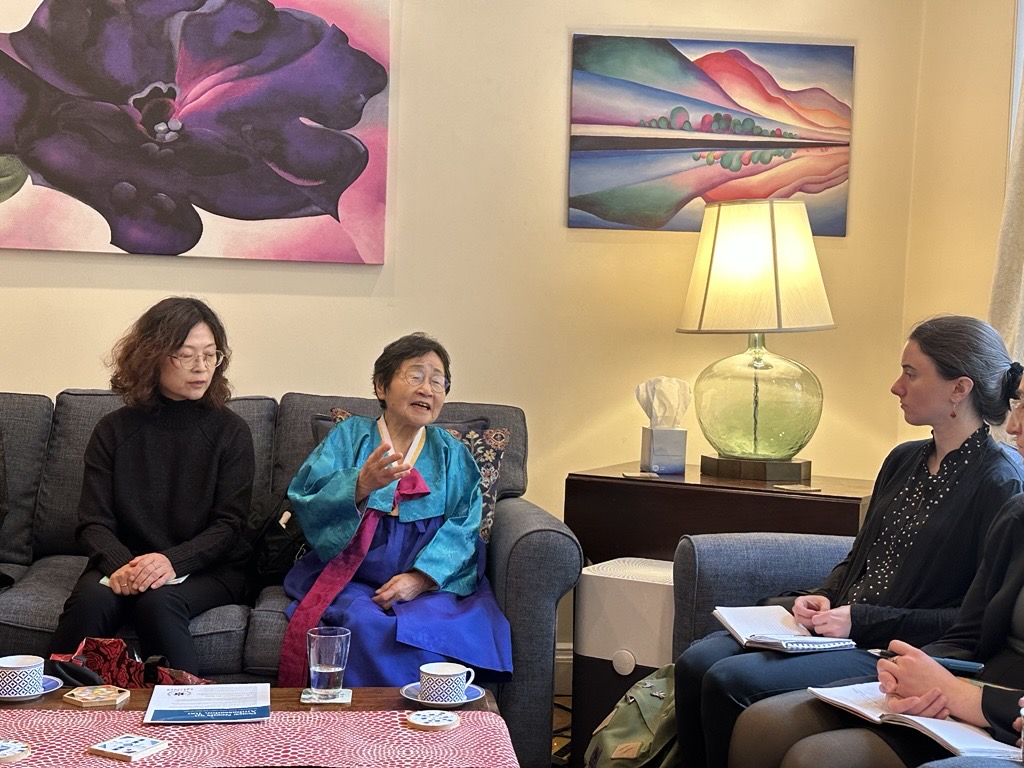On 4 March 2025, Quaker House was filled with energy by a visit from a delegation of advocates from Korean Anti-Nuclear Peace Action (KANPA). The group consisted of survivors of the atomic bombs dropped on Hiroshima and Nagasaki and their descendants, as well as Korean and Japanese peace activists from environmental and faith-based organizations. This month, KANPA is conducting a tour of the United States raising awareness for Korean survivors of the atomic bombs, who are often left out of memorializing and reparations plans. The delegation clearly expressed the need to recognize the pain – both physical and emotional – of 1st – 4th generation Korean hibakusha (survivors of the atomic bombs) through reparations and apologies by the US and Japanese governments.
QUNO was grateful to hear the witness of those survivors and their descendants. Through a translator, 92-year-old Park Jung Soon (pictured in a hanbok, Korean traditional dress) shared her testimony of surviving the bombing of Hiroshima as a young child. She described the shock of her house collapsing around her and awakening to her siblings’ cries, as well as the back pain she has lived with since being crushed by falling rubble. Similarly, Lee Tae Jae, President of the Descendants' Association of Korean Atomic Bomb Victims, spoke about his family’s experience of survival and the impact of Japanese colonialism. From 1910-1945, the Korean Peninsula was under Japanese colonial rule. Those who resisted Japanese rule were subject to torture and imprisonment, including Lee’s grandfather. Many Koreans were conscripted or forced to join the Japanese labor force in factories, especially during the war. Lee’s father was sent to work in Nagasaki. Though he survived the bombing, he worked in clean-up efforts in the city and the factory for a month, exposing him to radiation without protection. Lee explained that stories like these are suppressed, and the narrative of victimhood and survival of the atomic bombs’ horrors usually only addresses the Japanese experience. Uplifting suppressed stories challenges people around the world to ask questions about violent histories and encourages visions of a future free from colonial harm and war.
KANPA’s greater objective is to unite all victims of nuclear bombs, nuclear testing, nuclear accidents, and mining because all people living with the effects of the use of nuclear technology deserve recognition for their suffering and resilience. They hope to expand the focus of the international community out from commemorations of the atomic bombs to include other affected communities such as people from the Marshall Islands who were subjected to the effects of U.S. nuclear tests, and people in the Democratic Republic of Congo and New Mexico who face the adverse effects of uranium mining. KANPA’s tour of the US included time with a community of Marshallese survivors in Arkansas and affected communities in New Mexico. In New York, they participated in Nuclear Ban Week at the UN, advocating for more states to join the Treaty on the Prohibition of Nuclear Weapons. Their efforts to unite people for peace at the community level through powerful stories and shared experiences of survival has the potential to inspire action on the international level that would move us closer to a world free of the threat of nuclear weapons.







